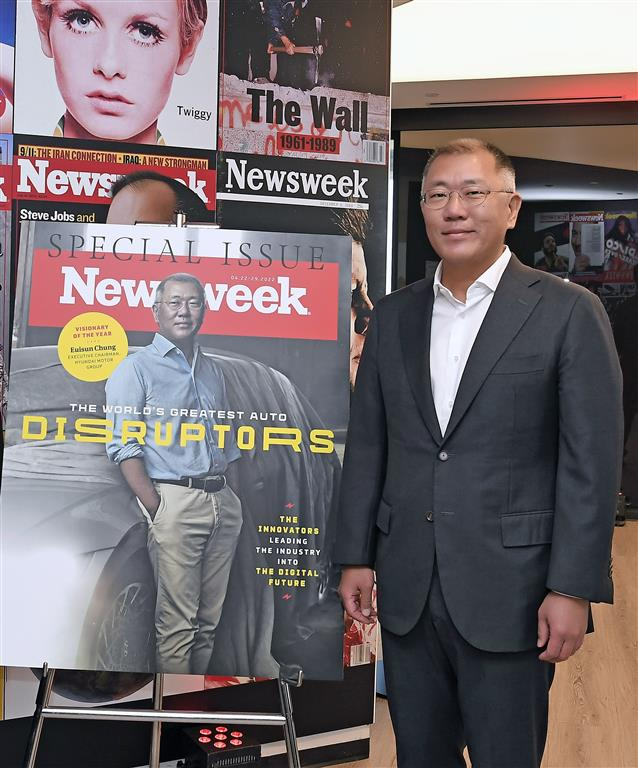Automobiles
Hyundai’s Chung named auto industry Visionary of the Year
Chung says there are some areas where automakers need to be self-sufficient, from components to finished goods
By Apr 13, 2022 (Gmt+09:00)
1
Min read
Most Read
LG Chem to sell water filter business to Glenwood PE for $692 million


Kyobo Life poised to buy Japan’s SBI Group-owned savings bank


KT&G eyes overseas M&A after rejecting activist fund's offer


StockX in merger talks with Naver’s online reseller Kream


Mirae Asset to be named Korea Post’s core real estate fund operator



Hyundai Motor Group Chairman Chung Euisun was named the automobile industry's Visionary of the Year by Newsweek, which credited him for driving transformative change not only in his business group but in the entire industry.
For the 2022 Auto Disruptors awards, Newsweek picked six innovators in six categories whom they credit with shaking up the automobile industry.
As a recipient of the magazine's first such award, the 51-year-old chairman appears on the cover of its April 22-29 special issue.
Since Chung assumed the group's chairmanship in 2020, the automotive group has brought numerous electric vehicles to market and has been testing hydrogen fuel-powered vehicles.
The acquisition of Boston Dynamics for around $1 billion in 2020 marked the culmination of his leadership. Boston Dynamics is a robotics company best known for its four-legged dog robot Spot.
"Those initiatives, which collectively put Hyundai Motor Group at the forefront of disruptive change in the industry, make Chung Newsweek’s Auto Disruptors Visionary of the Year," Newsweek said.
“The company also talked up what it calls ‘Metamobility,’ a combination of robotics and virtual reality that would connect users and their vehicles to the ‘metaverse.’”
Hyundai will have 14 electric vehicles (EVs) under the Kia brand by 2027 and 11 Hyundai and six Genesis EVs by 2030. The automotive group is aiming to sell 3 million units and capture 12 percent of the global EV market by 2030, according to the weekly.
While the adoption of hydrogen-fueled cars is being delayed due to the lack of the necessary support infrastructure, Chung said hydrogen fuel cell technology is complementary to battery EV technology, not in competition with it.
Hyundai has placed particular importance on further integrating its business, research and design and manufacturing operations.
"One needs to look no further than the ongoing supply chain challenges to understand why vertical integration is necessary ... in this business, there are areas where we need to be self-sufficient, from components to finished goods," Chung was quoted as saying.
Write to Han-Shin Park at phs@hankyung.com
Yeonhee Kim edited this article
More to Read
-
 Electric vehiclesHyundai to tackle EV rivals head on at New York auto show
Electric vehiclesHyundai to tackle EV rivals head on at New York auto showApr 12, 2022 (Gmt+09:00)
3 Min read -
 Electric vehiclesHyundai Motor unveils new EV charging platform to take on Tesla
Electric vehiclesHyundai Motor unveils new EV charging platform to take on TeslaApr 11, 2022 (Gmt+09:00)
2 Min read -
 AutomobilesHyundai Motor, Kia rank fifth in global electric vehicle sales
AutomobilesHyundai Motor, Kia rank fifth in global electric vehicle salesApr 06, 2022 (Gmt+09:00)
2 Min read
Comment 0
LOG IN


